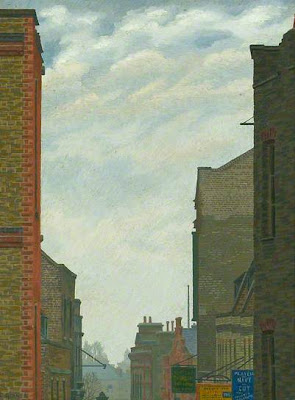On the other hand, as I have suggested in my "No Escape" series of posts, we are well advised to abandon the notion that an ideal place awaits us somewhere -- a place in which everything will sort itself out. Alas, I suppose that that applies to my daydream cell in San Marco, doesn't it?
Where does that leave us? I'm afraid we are fated to dwell in our head and in our heart -- and in the evanescent and indeterminate space which encompasses them both. What might that space be? The soul. Animula. Or, animula vagula blandula.
The soul can find contentment in a small space. Say an attic room. With stars.
David Tindle, "Door Slightly Open" (1978)
My Room
10 by 12
And a low roof,
If I stand by the side wall
My head feels the reproof.
Five holy pictures
Hang on the walls --
The Virgin and Child,
St Anthony of Padua,
St Patrick our own,
Leo XIII
And the Little Flower.
My bed in the centre,
So many things to me --
A dining table,
A writing desk,
A couch,
And a slumber palace.
My room is a musty attic,
But its little window
Lets in the stars.
Patrick Kavanagh, Collected Poems (edited by Antoinette Quinn) (Penguin 2004). The poem was first published in The Dublin Magazine in 1933.
David Tindle, "Mural Panel" (1978)
The Attic
Under the night window
A dockyard fluorescence,
Muse-light on the city --
A world of heightened sense.
At work in your attic
Up here under the roof --
Listen, can you hear me
Turning over a new leaf?
Silent by ticking lamplight
I stare at the blank spaces,
Reflecting the composure
Of patient surfaces --
I who know nothing
Scribbling on the off-chance,
Darkening the white page,
Cultivating my ignorance.
Derek Mahon, Poems 1962-1978 (Oxford University Press 1979).
David Tindle, "Back Room" (1987)
Finally, a poem that has appeared here before, but which is worth revisiting in this context.
Animula
No one knows, no one cares --
An old soul
In a narrow cottage,
A parlour,
A kitchen,
And upstairs
A narrow bedroom,
A narrow bed --
A particle of immemorial life.
James Reeves, Poems and Paraphrases (Heinemann 1972).
David Tindle, "Balloon Race, Clipston" (1980)
















